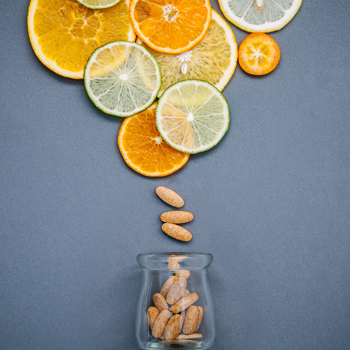เจาะตลาดยุโรป: ส่องเทรนด์ที่เปิดโอกาสให้กับสารผสมอาหารจากธรรมชาติสำหรับผลิตภัณฑ์เพื่อสุขภาพ
By: CBI*
Centre for the Promotion of Imports from Developing Countries
Translated By:
Editorial Team
Food Focus Thailand Magazine
การรับรู้และความเข้าใจในเรื่องสุขภาพของผู้บริโภคที่เปลี่ยนแปลงไป ตลอดจนการเข้าสู่สังคมผู้สูงวัย และภัยคุกคามของการดื้อยาต้านจุลชีพ ล้วนผลักดันให้เกิดความต้องการสารผสมอาหารจากธรรมชาติสำหรับการผลิตสินค้าเพื่อสุขภาพขึ้นในตลาดในยุโรป
1. มุมมองเรื่องสุขภาพที่เปลี่ยนไป
ทางยูโรมอนิเตอร์ได้คาดการณ์ว่าในปี 2556-2561 ตลาดผลิตภัณฑ์เสริมอาหารในยุโรปจะเติบโตถึงร้อยละ 28 โดยเฉพาะในยุโรปตะวันตก ทั้งนี้ คาดว่ามูลค่าตลาดผลิตภัณฑ์เสริมอาหารในยุโรปจะแตะยอด 3.2 พันล้านยูโรในปี 2561 โดยรัสเซียประเทศเดียวก็มีสัดส่วนเกือบร้อยละ 67
2. ตลาดกีฬาเติบโตอย่างแข็งแกร่ง
ในช่วงปี 2557-2563 ผลิตภัณฑ์เสริมอาหารทั่วโลกที่เจาะกลุ่มกีฬาจะเติบโตถึงร้อยละ 9.1 ต่อปี ตัวเลขนี้เป็นผลมาจากมุมมองเรื่องสุขภาพของผู้บริโภคที่เปลี่ยนแปลงไป โดยผู้บริโภคต่างมีความตระหนักในเรื่องสุขภาพทางกายและการออกกำลังกาย ซึ่งนำไปสู่การมีสุขภาพดี
3. ออร์แกนิคก็มาแรง
ผู้ซื้อสารผสมอาหารในยุโรปเริ่มคาดหวังกับสารผสมอาหารที่ได้มาตรฐานออร์แกนิค เช่น ปราศจากสารกำจัดศัตรูพืชตกค้าง ตัวอย่างเช่น ฝรั่งเศสได้พัฒนาแผน Ecophyto Plan ขึ้นในปี 2561 โดยมีเป้าหมายเพื่อลดการใช้สารกำจัดศัตรูพืชลงร้อยละ 50 จากปี 2551-2561
4. ละเอียดอ่อนกับการช่วยเหลือเพื่อนมนุษย์
สินค้าที่ทำการค้าอย่างเป็นธรรม หรือ Fair Trade ได้รับความสนใจมากขึ้น รวมทั้งสินค้าในกลุ่มสารผสมอาหารด้วย กระแสนี้เป็นที่โด่งดังในสหราชอาณาจักร ซึ่งผู้บริโภคให้ความสำคัญกับการช่วยเหลือเพื่อนมนุษย์ด้วยกัน พวกเขาอยากรู้ลึกไปถึงว่าคนที่เก็บเกี่ยววัตถุดิบคือใคร นี่เป็นโอกาสที่ดีที่ผู้ผลิตจะเพิ่มมูลค่าให้กับผลิตภัณฑ์โดยเลือกใช้สารผสมอาหารที่ผ่านการรับรอง
5. ต้อนรับเข้าสู่สังคมผู้สูงวัย
ภายในปี 2593 ประชากรชาวยุโรปประมาณร้อยละ 30 จะเป็นกลุ่มผู้มีอายุ 65 ปีขึ้นไป นับว่าก้าวกระโดดจากปี 2556 ซึ่งมีอยู่เพียงร้อยละ 17 กลุ่มผู้สูงอายุจึงเป็นเป้าหมายที่น่าจับตามองของผู้ผลิตสินค้าเพื่อสุขภาพจากธรรมชาติ
นอกจากนี้ยังมีเทรนด์ของความเครียดที่มีมากขึ้น ความชื่นชอบชาเพื่อสุขภาพ ความกังวลกับการดื้อยาต้านจุลชีพ การบำบัดด้วยกลิ่นหอม ความสนใจต่อยาสัตว์จากสมุนไพร ความต้องการผลิตภัณฑ์เกี่ยวกับยาสมุนไพรที่เพิ่มขึ้น เป็นต้น
A changing perception of health, the ageing population and the threat of antimicrobial resistance drive European demand for natural ingredients for health products.
1. Changing Perception of Health
Euromonitor expects the European food supplements market to grow by 28% from 2013 to 2018. Demand for food supplements is strongest in Western Europe. In 2018, the region is expected to reach a market size of €3.2 billion. Russia makes up around two thirds of that.
2. Growing Demand for Sports Supplements
Globally, the market for sports supplements is expected to grow by 9.1% annually from 2014 to 2020. This growing demand is another result of the changing perception of health. Consumers are increasingly aware that physical health and fitness help to be healthy.
3. Growing Demand for Organic Ingredients
More and more European buyers of conventional ingredient are starting to expect ingredients that meet standards for organic. For example, France has developed the Ecophyto plan 2018 to reduce pesticides by 50% from 2008 to 2018.
4. Consumer Interest in People-Helping-People
Demand for fair trade ingredients in food supplements is growing. This trend is especially strong in the UK. Consumers are interested in ‘people helping people’. They want to hear stories about the people who harvest and produce the ingredients used in their health products. This offers opportunities for you to add value by marketing certified ingredients.
5. Marketing Products to an Ageing Population
By 2050, around 30% of the European population is estimated to be 65 and older. This is opposed to 17% in 2013. The elderly are an important market for natural healthcare manufacturers.
Moreover, there are rising stress levels, growing popularity of herbal teas for health, concern over antimicrobial resistance, growing popularity of aromatherapy, the interest in herbal veterinary medicine, the increased world demand for European herbal medicinal products, etc.
